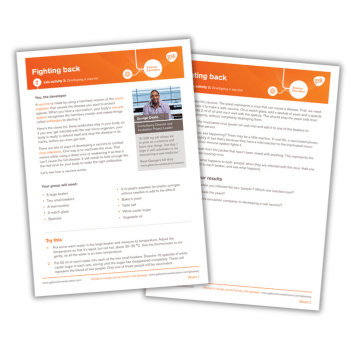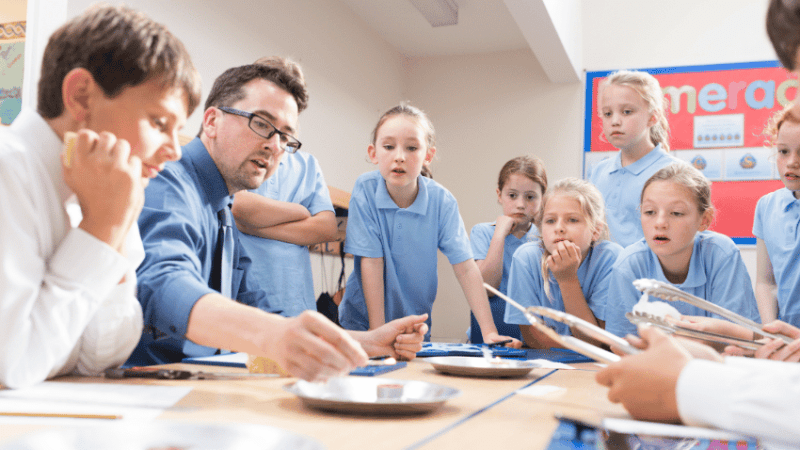Classroom discussion – Why is it so difficult to do in science lessons?

From teacher-dominated talk to rapid-fire questioning, Paul Spenceley highlights the issues commonly encountered during class discussions in science lessons

At its core, science as a subject is all about asking questions and looking for answers.
So why is it that in the vast majority of the hundreds of science lessons I have observed, over many years in a wide range of different schools, the ‘class discussion’ part of the lesson has so often been, by some distance, the weakest part?
It never ceases to amaze me that so many teachers feel that all teachers can ‘obviously’ run discussions with groups of students, and similarly, how little focus this essential skill is given at a practical level with teacher training, in too many cases.
It just ‘happens’
Just one example of this from trainee teachers is when I have been shown lesson plans, sometimes running to several sides of A4 with almost every detail of the lesson meticulously planned – even subdivided at times into ‘what the teacher will do’ and ‘what the students will do’ sections – and more often than not, near the start, the end or both, in parts of the lesson plan there will be the word ‘discussion’ with an allotted time
for it.
Sometimes, more information will be provided, such as, ‘Discussion to check understanding of the first learning objective.’ No matter how these lesson plans are worded, the implication is the same; that the discussion will somehow just ‘happen’ with the teacher in control of it.
For teachers with more experience, lesson plans often contain less, not more, information on these mysterious ‘discussions’. When queried about this, the inevitable response is almost always something vague, such as ‘I will use a range of questions to find out what the students have actually learned.’
From my experience, discussions are usually by some way the weakest part of science lessons, but it is not just me saying this, because it turns out that there has been plenty of research carried out on oral work in schools. So, what do we know about classroom discussions?
Teachers dominate
At one conference I attended, it was mentioned (citing Vivian Cook’s book, Second Language Learning and Language Teaching) that teachers usually dominate 70-90% of lessons. But do science teachers really dominate science lessons and discussions to this degree?
Should you feel that this imbalance does not occur in science discussions in your school, then next time you have an opportunity to observe a science lesson, use two stop clocks. Switch one on each time the teacher speaks to the
class, and use the other each time students speak (officially, that is – not just chatter while ‘working’).
Whether you get those exact figures of 70-90% or not, one thing is guaranteed – in far too many science lessons, the balance will be hugely in favour of the teacher speaking.
An interesting aside here is that whenever I have done this, even when presented with the evidence of the figures from the two stop clocks, most teachers have disputed the findings and insisted that there must have been a mistake. It seems that not only do science teachers like to dominate lessons, and discussions in particular, but that they do so often, without even being aware that they are!
The silent many
Another fact I came across is that apparently 60% of secondary school students never have a conversation with an adult on any one day at school (as observed in the 2006 book Transforming Education for Every Child: A Practical Handbook by John West-Burnham and Max Coates). Again, it is not the detail of this fact that concerns me, but the accuracy of the idea behind it with regards to science lessons.
Is it really true that more than half of the students say nothing to the teacher during a science lesson? Again, this can be fairly easily checked during a lesson observation. One way in which I’ve done this is to use a seating plan of the students, and simply put a tick by each name when a student makes an oral contribution to the lesson.
One thing this will undoubtedly confirm is that all too frequently – especially in larger groups – well over half of the students will not contribute at all. The ‘silent few’ are, in fact, more often, the ‘silent many’.
Another fact I picked up at some point and looked into is that apparently, the average length of response from a secondary school student to a question is five words. If so, this would clearly not be of much value in demonstrating their level of learning during a discussion. The shortness of students’ responses can be checked quite easily by using a seating plan in combination with a simple three-tier measure (see ‘Get them talking’ below).
Trending
Wait times
My favourite fact about discussions is one that Dylan Wiliam introduced me to in the early days of the King’s College Assessment Project. Apparently, the average wait time between a teacher asking a question, and then adding to it with another follow-on statement or other form of ‘encouragement’ is… 0.9 seconds.
That’s right, folks – the average teacher waits for less than a second between finishing what they have asked their students and starting to talk again!
And yet, so many teachers wonder why so few students join in their ‘discussions’! The next time I observed a colleague teaching, I sat with my stop clock and timed his ‘wait times’ between asking a question and starting to say something else to trigger a response. The colleague was an outstanding science teacher, yet even he had wait times that were often too short to time accurately and never ran to more than two seconds.
Science teachers, I have to say, are particularly bad at this, too quickly adding additional information or clues to ‘help’ or ‘steer’ the answers. A teacher may ask students, ‘Do you remember the chemical used to do photosynthesis?’ but very quickly follow this with a clue, such as, ‘It sounds like the chemical used in swimming pools.’
This is often due to the fear that they will not be able to ‘teach’ all the knowledge they need to unless they move through the discussion quickly; again, the emphasis being on teaching, not learning.
I am sure there are many more key facts about classroom discussions that you could find with a bit of research, but these are the ones that I have taken on board over the years. They illustrate extremely well some of the big problems with ‘discussions’ in science. This is why using class discussions as a starter or plenary idea is often less than successful as a method of measuring prior learning.
Get them talking
Below is a rough approximation of the type of responses students typically give:
Tier 1
A short-answer response using a single word or phrase, or very short statement: ‘Photosynthesis’, ‘Unbalanced forces’ or ‘They are all non-metals’.
Tier 2
A longer sentence or possibly a short explanation: ‘The arrows show the direction the energy flows in a food chain’ or ‘Alpha radiation is weakest, as paper stopped it.’
Tier 3
Longer responses of more than one sentence, usually with more detailed reasoning or explanation: ‘Herbivores have eyes at the sides of their heads. This gives them a wider field of vision, so they can see potential predators.’
Having tried the approach myself, in most cases answers tended to fall into tier 1, with a few in tier 2 and even fewer, often none, in tier 3. This highlights that too many responses in science discussions are far too short to give a really good indication to either the teacher, or the student, of actual learning.
Paul Spenceley is a retired classroom science teacher, having previously worked for 35 years across both comprehensive and grammar schools, and is a regular visitor to schools and speaker at conferences across the country; this article is based on an edited extract from his book, Successful Science Teaching (John Catt, £15)








